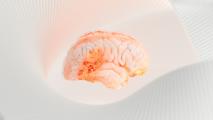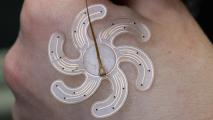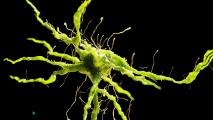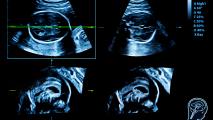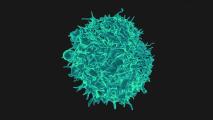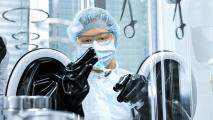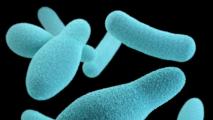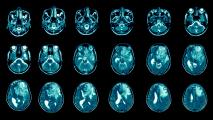
Biotech
Human history has been all but defined by death and disease, plague and pandemic. Advancements in 20th century medicine changed all of that. Now advancements in 21st century medicine promise to go even further. Could we bring about an end to disease? Reverse aging? Give hearing to the deaf and sight to the blind? The answer may be yes. And soon.
More
Discovery finally uncovers how melanin blocks UV
An international team of researchers have isolated and analyzed a component of melanin, which protects us from the sun.
Scientists discovered a “minimum mechanism” required for consciousness
Scientists stimulated the brains of macaque monkeys in an effort to determine which areas are responsible for driving consciousness.
New electronic pill zaps the stomach to regulate hunger
MIT’s new electronic pill stimulates stomach cells to regulate hunger — showing it’s possible to hack the powerful gut-brain axis.
A banana that doesn’t go bad so fast approved by the Philippines
Billions of bananas are wasted every year, but that may change soon.
Psychedelic inspires discovery of two new drug candidates for depression
Researchers have found ibogaine-inspired compounds effective in treating depression and addiction in mouse models.
This soft brain implant unfurls its arms under the skull
A soft brain implant that unfurls under the skull could make implantation surgeries less costly and risky.
To be a happier, more successful person, get off the “hedonic treadmill”
Eudaimonic pursuits are outwardly focused, whereas hedonic activities are concerned with self-centered fulfillment.
Man’s mutated gene appears to delay onset of Alzheimer’s
The discovery of a second person naturally resistant to a genetic form of Alzheimer’s could lead to treatments for the disease.
First-in-US brain surgery performed in Boston
A surgical team has performed a surgery that alleviated a dangerous brain condition before it was too late.
3 key activities will make you “antifragile”
Resilience is vital for dealing with failure, and stems from three traits: self-esteem, psychological flexibility, and emotional regulation.
The groundbreaking plan to map the entire human immune system
Powered by AI and a vast trove of data, the Human Immunome Project aims to fully map the most complex system in the human body.
Personalized mRNA vaccine preps the body to battle deadly cancer
A new pancreatic cancer vaccine based on mRNA tech was shown to be safe and capable of triggering an immune response in a small trial.
Amish gene study finds clues to mood disorders like depression and bipolar disorder
Researchers have turned to this unique genetic population to find insights into how our genes play a role in mental health.
CRISPR sausage gets FDA green light for consumption
The FDA has given Washington State University researchers the green light to feed five gene-edited pigs to people.
Potential way to treat anorexia found in microbiome
New research links the gut microbiome, an ecosystem of viruses, bacteria, and fungi, to the development of anorexia nervosa.
New gene therapy could reverse a common cause of blindness
A new study suggests we may be able to convert dormant eye cells into photoreceptors to reverse retinal degeneration.
Rapamycin: The unlucky history of the most powerful anti-aging drug
When rapamycin research was revived, it was found to have both anti-cancer and anti-aging properties. Here’s what researchers say today.
Ultrasound could help us fight the deadliest cancer
In a small study, Northwestern researchers were able to get chemo drugs into the brains of glioblastoma patients with implanted ultrasound devices.
LSD flashbacks and a psychedelic disorder that can last forever
LSD flashbacks have been studied for decades, though scientists still aren’t quite sure why some people experience them.
AI helps terminal cancer patients make the most of their final days
An AI that encourages doctors to talk to cancer patients about their end-of-life care impacts how they choose to live out their final days.
Get inspired with the most innovative stories shaping the world around us.














